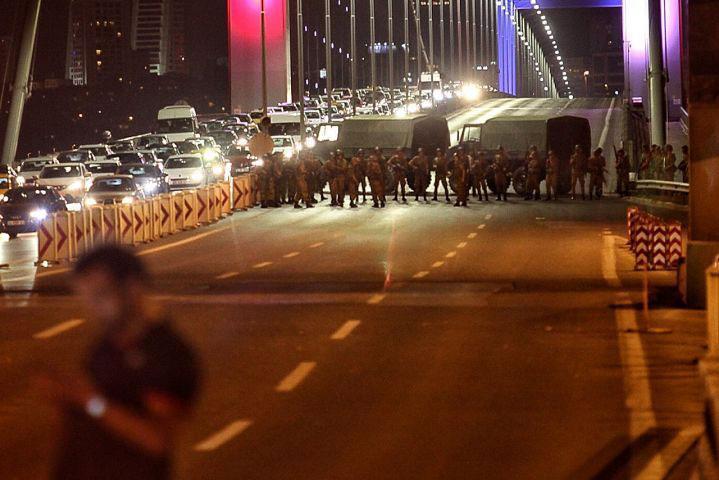Turkey facing the consequences of the military coup
Update – July 16
At least 161 people have been killed and 1,154 wounded as the result of an attempted coup in Turkey on the night of July 16. Up to 3,000 military personnel were arrested.
Recep Tayyip Erdoğan, who was holidaying in Marmaris when the coup took place, gave an interview upon his arrival in Ataturk airport, saying that the attempted coup was 40 years in the works by those who organized it.
“The people who staged the attempted will pay the highest price and will answer for this treason…As the saying goes, everything has a positive side, so I perceive this incident as a ‘blessing from Allah’. It has allowed us to purify the Armed Forces from insurgents.
The local and international mass media reported on July 15 that there had been an attempted military coup committed by a group of officers from the Turkish Armed Forces.
As it was pointed out in a statement published on the Turkish Armed Forces’ official website, the Turkish military wished to seize power in order to protect the democratic order and to uphold human rights. In another statement, the military expressed its hope for the normalization of ties with countries around the world.
The course of events
15 July:
23:10 Military hardware deployed in Ataturk and Sabiha Gökçen airports. The armed military erected barricades;
02:39 The Turkish Grand National Assembly was fired upon (according to the Anadolu state-run news agency);
22:26 The soldiers blocked the Boğaziçi bridge which goes across the Bosphorus and all flights were cancelled in Ataturk airport in Istanbul (the opposition Sözcü newspaper reported).
22.30 Turkish armed forces gained control over the NTV pro-governmental TV channel).
In addition, there were social media reports on the deployment of tanks, blasts, a firefight and a confrontation in the streets.
The local NTV channel also reported that General Hulusi Akar, the Chief of General Staff of the Turkish Armed Forces, had been taken hostage.
After this, Nejet Ozal, ex-Chief of General Staff, stated that the imprisonment of high-rank officers was unacceptable and they should be immediately released. Hulusi Akar was released within the next few hours.
Some time later, Turkish PM, Binali Yıldırım told NTV that there was an attempted coup in Turkey, but it was just an attempt aimed against democracy, and that it was prevented. The PM also tweeted that the perpetrators would face the most severe punished for what they did.
The news agency Anadolu reported on the deaths and injuries during the firefight.
According to the news agency Gölbaşı, 17 military personnel were killed during the attack on the riot police.
The country’s top officials condemned their actions from different positions. The opposition leaders supported the them (Sözcü).
The country’s president, Recep Tayyip Erdoğan, released a video address, calling on the population to go out into the street and defend the government (all TV channels broadcasted this address).
Then, early in the morning (04:30) the head of state gave an interview to journalists at Ataturk airport.
Iranian Foreign Minister, Mohammad Zarif, expressed his support of Turkey on his Twitter page.
The population in big cities of Turkey went out into the streets in protest against the coup.
The Turkish media reported early on July 16 that the attempted coup had been organized by a group of military personnel from the Turkish Air Forces. Their military base is located 35 kilometers north of Ankara, near Kazan.
The military personnel, who blocked the Boğaziçi bridge during the night, surrendered to the forces loyal to the government.
—————————————-
15 July
Turkish armed forces declared on Friday that they would seize power in order to protect the democratic order and to uphold human rights.
In a statement sent by email, reported on Turkish TV, the military stated that all of Turkey’s existing foreign relations would be maintained and that the rule of law would remain a priority.
Turkey’s prime minister previously stated that a faction within the army had attempted to seize power, that they would be pushed back and that it was wrong to call it a coup.

Footage on local television showed military vehicles blocking bridges over the Bosphorus in Istanbul and tanks which had been stationed at the city’s main airport. In the capital Ankara, warplanes and helicopters roared overhead. A Reuters journalist heard gunshots.
A Turkish official, who does not wish to be named, said that soldiers had also been deployed in other cities in Turkey, but did not specify which ones.
The Dogan News Agency reported that a national police directorate has put all police on duty in Ankara.




















